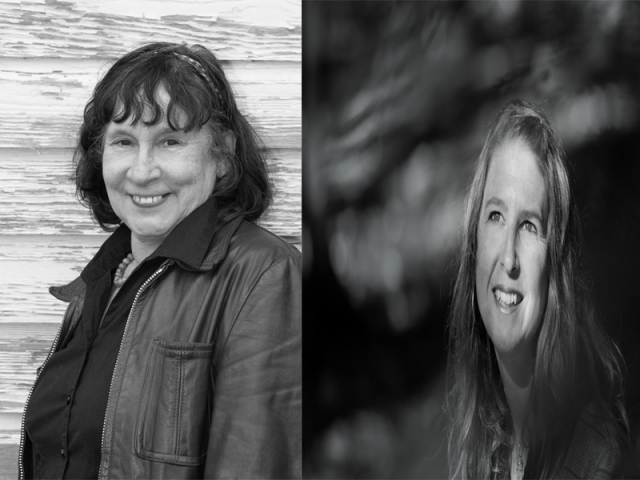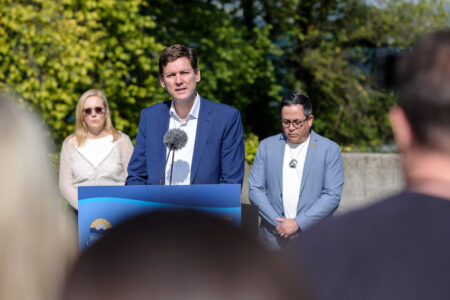Municipal Election 2014: Area D candidates discuss water quality and climate change
Kaslo residents Aimee Watson and Donna Cormie are on the ballot in Area D — Lardeau, Argenta, Howser, Gerrard, Cooper Creek, Poplar Creek, Ainsworth, Mirror Lake, Marblehead, Johnson’s Landing, Shutty Bench, Meadow Creek — to see who will replace retired director Andy Shadrack in Saturday’s Regional District of Central Kootenay Election.
Watson, who grew up in a small town outside Ottawa, moved to the region in 1997 and has been a BC resident ever since.
In 2004 Watson visited, in her eyes, the most beautiful little town in BC, Kaslo, and found a new home.
Watson worked up to eight jobs until she was hired by North Kootenay Lake Community Services Society to carry out a food forum for the region.
Within a year of that research the Kaslo Food Security Project was born.
In 2009, we opened the doors to the first accredited community food center in Canada.
Watson is no stranger to the RDCK board table having served as alternate to Shadrack from 2011 to 2014.
Cormie, also a resident of Kaslo, served for two terms as Councilor for the Village of Kaslo and was elected three times to the board of directors for Kaslo and District Community Forest Society.
With a background is in small business, tourism, Cormie works part-time for North Community Lake Community Services Society as a mental health outreach worker.
The Nelson Daily contacted both candidates with questions in Area E, Area F and Area D to help readers decide where to mark the “X” at the polling station Saturday, November 15. Candidates in Area G decided not to participate.
The Nelson Daily: Water quality is an issue for many RDCK residents on their own water systems. What are you prepared to do to help them remove boil water advisories or water quality advisories if elected?
Aimee Watson: Water quality issues are a perception that not everyone would agree with as being an issue. Many of our communities in Area D have either private systems they are more than happy to have under their own management and many have water user’s advisory groups. In either situation, I would follow the assent of the users.
If they choose to have a community system installed that is a service of the RDCK; I would support that and ensure it is done in the most efficient and safe way. If they choose to not go with a community system and focus on POE (point of entry), I would support that and advocate where necessary to ensure they are able to have the water and system they would like.
Donna Cormie: In area D there are many water systems. Many of which are now dealing with the IHA regarding delivery of potable water. Loki Veiw Lots(formally the Lease Lots) have borrowed money and installed a water treatment plant.
Mirror Lake and Fletcher Falls water users are are trying to figure out the best way forward. I will work with user groups to come to best solution.
The Nelson Daily: How do you think climate change will affect the residents in your area and what are you prepared to initiate during your four years of office to address it?
Donna Cormie: Two ways we could decrease our impact on climate change is by focusing on improving how we deal with our waste and also by improving our public transportation system.
Aimee Watson: Most important in our region is to monitor our streams and water flow. Some areas are affected mostly by rainfall where others are affected by ground water levels; thus snow pack and overall fresh shet levels will indicate how well the water tributaries will be affected. Given the last few years of mud slides and wash outs- this is the area we need to focus on to be as preventative as possible.
Although streams, creeks and other water ways are generally the jurisdiction of either the Ministry of Environment or Forest Land and Natural Resources, preventative measures are not their line of work so we need to actively do all we can to be kept up to speed on how the water flows are behaving and or could be causing major disasters as we saw with Johnsons Landing and Hammill Creek.
Water monitoring would be number one approach for safety. As well, supporting our local farmers to continue to build a strong and viable local food shed is also essential. As we see California’s water dry up, the cost of and access to foods will be altering.
Our ability to meet our dietary needs and build up our own food shed is also important.
Both of these action have further bonuses of community resiliency given a) the more we know about our water sheds, the more we can be preventative in care and b) the support of building up of our food shed is also increasing the economic development of the area while providing essential needs. No matter the why of the changing climate; these actions provide positive effects.

























